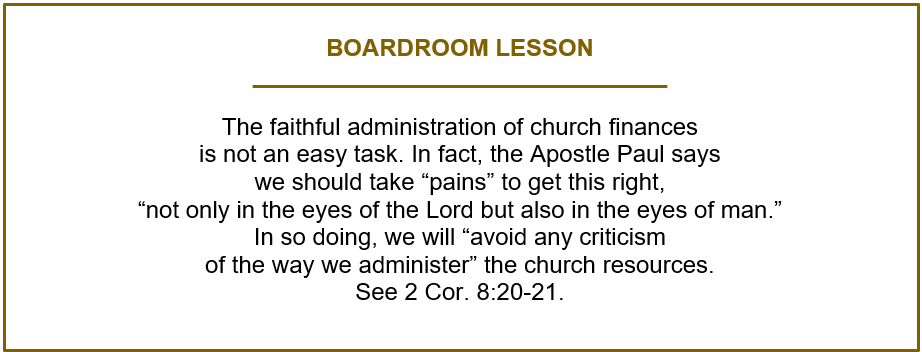
7 Ways to Avoid a Financial Train Wreck
Financial derailment of a church is usually a collective failure, but the finger almost always points back to the governing board.
Published in INSIGHT - Spring 2019
by Dan Busby, CPA, and John Pearson

In church governance, high attention must be given to the spiritual aspects of the church—focusing on the spiritual health of the body.
All too often there is a tension in church governance between spiritual matters and faithful administration of financial resources. It is easy for the financial administration of a church to take a backseat to the spiritual matters. There must be a balance of both the spiritual and material.
When too little attention is paid to faithful administration of church finances, it invites a financial train wreck. Sometimes, a train wreck is avoided, but a church may endure a very rough stretch of track.
So, how can a church significantly reduce the likelihood of a financial train wreck? Begin by ensuring your board includes members who are highly competent in understanding church financial reports and nonprofit accounting. Then there are the seven “big financial rocks” for church governing boards:
- Keep borrowing under control. When there is a church financial train wreck, it often relates to too much debt. Yes, the derailment may relate to a sudden pastoral change, a significant downturn in giving, a fall-off in attendance, and a variety of other factors. But, in the final analysis, there is often more debt than can be realistically serviced by the church.
- Establish a strong stewardship culture. A church governing board must set the tone for a strong stewardship culture for the entire church, including financial
integrity and accountability. A sound stewardship culture rarely travels from the bottom of the organization up to the governing board—it almost always travels down the chart.
What does a strong stewardship culture look like? The governing board knows and respects the budgetary and financial reporting processes. The financial staff respect the authority of the governing board. Further, the board oversees the risk assessment and internal control structure for the church.
- Approve reasonable operating budgets. Every church should have an operating (and perhaps a capital expense) budget that is annually approved by the appropriate oversight body (e.g., congregation, board, or committee).
The church budget provides a rail or a curb for influencing financial activity. It is important that the budget process supports the church’s strategic plan. Reasonable projections of church revenue and expenses mean the church is not adopting a stretch goal, which is almost impossible to attain. A good budget process means that 11 acts of war can be eliminated because one annual battle is substituted for 12 monthly skirmishes.
- Maintain adequate cash reserves. Adequate cash reserves allow obligations to be paid on time, which is a positive witness for Jesus Christ. Cash reserves are the cushion that ensures:
- Operating expenses are paid on time instead of incurring late fees.
- A temporary downturn in giving does not result in a sudden staff layoff.
- The church is in compliance with mortgage covenants, and the financial institution does not enforce negative consequences.
- Funds are available to replace worn-out HVAC, roofs, and more.
- The church has the necessary funds ready to open a new site or launch a new ministry instead of starting from scratch.
- Funds are on hand to cover all donor-restricted or designated gift balances.
In determining the adequacy of church cash reserves, the critical question is whether there is adequate cash at the church’s lowest cash point in the year—which is generally during the summer months. This will often be two to four months of operating cash.
- Honor giver expectations and intent. Most churches receive gifts that have been designated (“restricted” is the technical accounting term) by givers. A gift might be designated for the missions fund, the building fund, the benevolence fund, and so on. Designated gifts must be spent for the giver’s intended purpose in a timely manner.
Two more important thoughts: (1) To honor giver expectations and intent, a church must segregate the revenue and expenses relating to designated gifts in the accounting records, and (2) church governing boards rarely have the authority to overturn a giver’s designation.
- Use appropriate financial transparency. Churches must find the “sweet spot” between absolute financial transparency and no transparency—we call it appropriate transparency—where trust is maximized with minimal disruption or risk to the church.
- Create a compensation process for the senior pastor that models high integrity. This very important “big rock” has its own lesson.

Board Action Steps:
- Review: The governing board should periodically review these seven “big rocks” for faithful administration of the church finances.
- Determine: Grade your church on a scale of 1-10 (10 is high) to determine strengths and weaknesses in the seven areas.
- Take Action: If the church has a significant weakness in any of the seven areas, take action to strengthen the area or areas that need attention.
